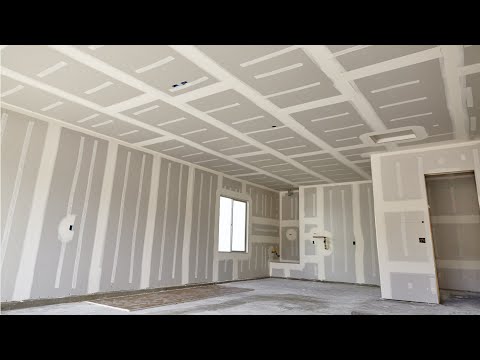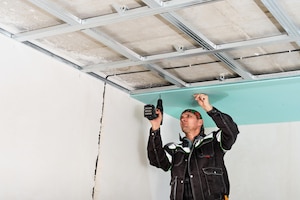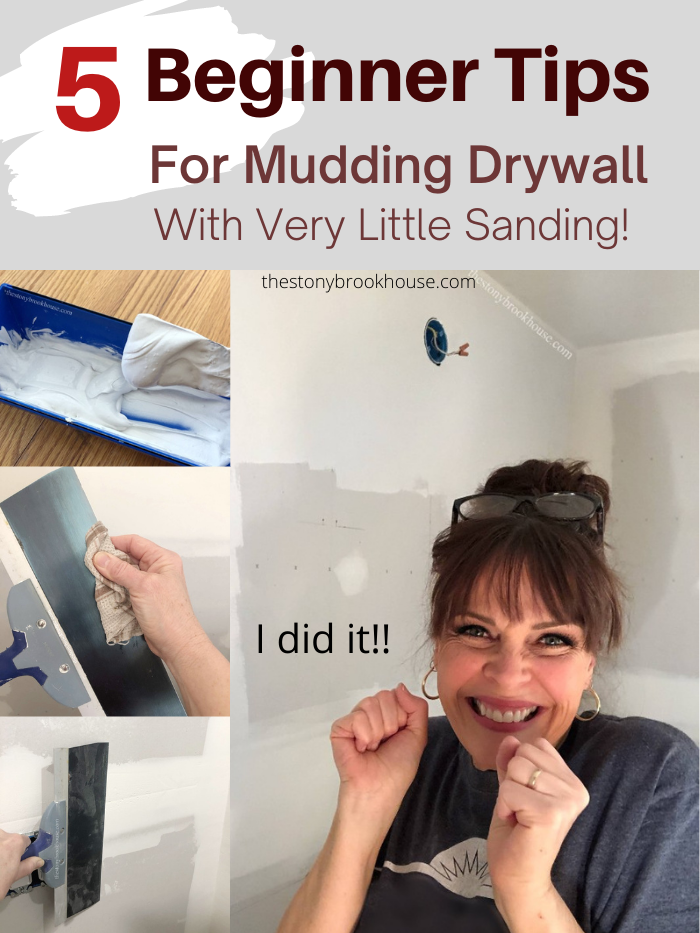
Drywall is an important material in building construction. Although drywall is durable and lightweight it can also be easily damaged. In order to ensure the quality of your property, you should have the services of a professional installer.
Drywall is typically installed as an alternative to plaster or wood. Drywall is most commonly used for interior walls. This type of wall construction involves using a gypsum-based core to create a solid, insulated surface. Unfortunately, drywall is susceptible to damage over time, making it difficult to repair.
Joint compound can be used to repair damaged drywall. Once the mud dries, you can paint your wall with a new color. A second coat will blend the taped joints and give the drywall a more aesthetically pleasing finish.
A professional may be able to help you if there is a large crack in your drywall. A skilled handyman or contractor will be able to complete the job quickly and efficiently at a fair price.

Make sure to read all instructions before you start this project. Also, you should wear safety goggles and gloves. You will first need to clear the area. Next, measure and mark the area. A square guide can be used to mark any damaged areas, such as if the wall is cracked in multiple places. A sharp razor knife can be used to make the hole.
A drywall smoothing device is needed to fix minor scrapes and abrasions. A utility knife is also a good tool to verify the level of the wall with the surrounding timbers. The last thin layer can be applied with adrywall knife after you're done.
If you have an older home, you should be aware that it might contain asbestos and lead paint. Before you start drywall installations, ensure that the home is free of asbestos and lead paint. You must use the right tools to make sure your project is safe and successful.
Dents are another common problem. You might be able repair a ding in your wall with a spackle or sander. A spackle can be used to repair dents.
Drywall can be affected by moisture, abrasions or poor nailing. These problems can lead to drywall becoming weaker and can allow pests and moisture in your home. While most damages to drywall are not serious, it's a good idea for you to inspect the area. Smaller holes will usually require a simple patch, while larger holes will need to be repaired.

Depending on the extent of your damages, you can do the drywall install and repair yourself or hire a handyman. A professional handyman should be capable of doing the job for between $60 and $90 an hour.
If you are concerned about the safety of your drywall, it is best to get professional help. You can get professional help with everything from taping to sanding to secure the wall. Having the right professionals can save you money in the long run.
FAQ
What should I do if I want to hire an architect/builder?
You may find it easier to hire someone else to complete your renovations if you own the home. However, if you are planning to buy a new home, then hiring an architect or builder will help you make sure that you get exactly what you want.
How many times should I change my furnace's filter?
It all depends on how frequently your family uses your home heating system. If you plan to leave your house for long periods of time during cold weather months, you may consider changing your filter more frequently. But if you do not often go outside, it may be possible to wait longer between changing your filter.
The average furnace filter will last approximately three months. This means that you should replace your filters every three months.
For information on when to replace your filter, you can consult the manufacturer. Some manufacturers recommend that you replace your filter after every heating season. Others suggest waiting until there are visible dirt deposits.
Are you able to live in a renovated house?
Yes, you can live in your house while you renovate it.
Can you live in a house while renovations are going on? The duration of the construction works will affect the answer. If the renovation takes less than two months, then you can live in your house while it is being built. You cannot live in the home while renovations are taking place if they last more than 2 months.
It is important that you do not live in your home during major construction. A lot of heavy machinery is used at the jobsite, which can lead to noise pollution and dust.
This is especially true when you live in a multistory house. In such cases, vibrations and noises from construction workers may cause irreparable damage to your property.
You'll also need to cope with the inconvenience of living in temporary housing while your house is being renovated. This means you won't be able to use all the amenities in your own home.
For example, you will not be able to use your washing machine and dryer while they are undergoing repair. You will also have to put up with the smell of paint fumes and other chemicals as well as the loud banging sounds made by the workers.
All these factors can lead to stress and anxiety among you and your family members. Therefore, it is important to plan ahead in order not to feel overwhelmed by the situation.
Research is key when you are considering renovating your home. It will save you money and help you avoid costly mistakes.
It is also advisable to seek professional assistance from a reputable contractor so that you can ensure that everything goes smoothly.
How much does it take to renovate a home?
Renovations usually cost between $5,000 and $50,000. Renovations are typically a major expense for homeowners, with most spending between $10,000 and $20,000
Is it less expensive to renovate an existing house or build a new one?
There are two options available to you if you're considering building a home. You can buy a pre-built house. These homes are ready to be moved into and have already been built. Another option is to build a custom home yourself. This option will require you to hire a builder in order to design and build your dream house.
How much time and effort you put into designing and planning your new home will determine the cost. A custom home may require more effort because you'll likely need to do most of the construction work yourself. But, you also have more control over which materials you choose and where you place them. It might be simpler to find a contractor specializing in building custom homes.
A new home is usually more expensive than a remodeled home. You'll have to pay more for land and any improvements. Additionally, permits and inspections will be required. On average, the price difference between a new and remodeled home is $10,000-$20,000.
Statistics
- Rather, allot 10% to 15% for a contingency fund to pay for unexpected construction issues. (kiplinger.com)
- They'll usually lend up to 90% of your home's "as-completed" value, but no more than $424,100 in most locales or $636,150 in high-cost areas. (kiplinger.com)
- The average fixed rate for a home-equity loan was recently 5.27%, and the average variable rate for a HELOC was 5.49%, according to Bankrate.com. (kiplinger.com)
- According to the National Association of the Remodeling Industry's 2019 remodeling impact report , realtors estimate that homeowners can recover 59% of the cost of a complete kitchen renovation if they sell their home. (bhg.com)
- On jumbo loans of more than $636,150, you'll be able to borrow up to 80% of the home's completed value. (kiplinger.com)
External Links
How To
How much should I spend on restoring my house?
The cost of renovating a home depends on how many rooms it is, what kind of renovations, where it is located, and whether the work will be done by professionals or you. Depending on the scope and size of the project, the average renovation cost is between $10,000 and $50,000.
If you plan to sell your house after renovations, the value of the home will likely be lower than its market value. This is because you do not take into consideration the costs for repairs, upgrades, or improvements. You might even lose money if you put too little effort into making your home look its best before selling. On the other side, if your home is in a good condition, you can get more money if you put in the effort.
These factors can help you make a decision about which projects to take on first.
-
Your budget. If you have a limited budget, start small. One room can be tackled at a time such as painting walls or changing flooring. For major renovations, you can either hire a contractor who specializes on kitchen remodeling or save money.
-
Priorities. Are you looking to improve the general condition of your house or fix specific problems? One issue can become a major problem quickly, so it's important to choose a single area. For instance, if your roof leaks every time it rains, you might end up having to replace it sooner rather than later.
-
Your timeline. Consider your timeline. If you're considering buying a property next year and want hardwood floors installed or new bathroom fixtures, then you won't want them to be done right away. For these types of updates, you may wait until your house is sold to make the necessary changes.
-
Your skills. If you are unable to do a certain task, get someone else to do it. For example, if your carpentry skills aren't strong enough to build custom cabinets, you might be able to hire a cabinet maker to do the job.